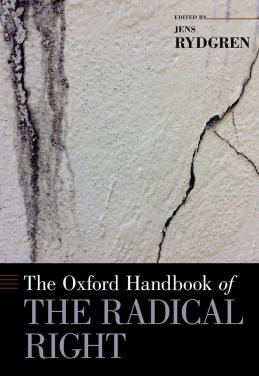It is time to hear Prof. Kai Arzheimer — one of the major experts on radical right parties — talking about Germany, AfD, Great Recession, populism in Portugal and Spain, Vergangenheitsbewältigung, and much more.
He explains who are the typical voters of radical right parties, and examines the role of the media, immigration, and European integration. Why populism does not thrive whenever there are promising conditions, what is going on in Poland and Hungary , and the future of democracy in Europe. Enjoy the read.
 POP) You have been working for a long time on the causes behind the electoral support for radical right parties. In particular, it remains essential your 2006 article complemented by the more recent chapter for the Oxford Handbook of the Radical Right. You even created the very informative Radical Right Research Robot.
POP) You have been working for a long time on the causes behind the electoral support for radical right parties. In particular, it remains essential your 2006 article complemented by the more recent chapter for the Oxford Handbook of the Radical Right. You even created the very informative Radical Right Research Robot.
So, please: tell us. Why do people vote for radical right parties? What are the variables at the micro, meso, and macro levels that can explain this phenomenon?
Kai Arzheimer) People voting for the European Radical Right are above all motivated by their opposition to immigrants and immigration in general and Muslims and Islam in particular, which they perceive as an economic and cultural threat to their way of life. While such views are by no means limited to the electorate of the Radical Right, they seem to be a necessary condition for becoming a Radical Right voter. Radical right voters are also highly critical of the established parties and elites and tend to oppose European integration, but these beliefs are very closely linked to their anti-immigrant views. In socio-demographic terms, Radical Right voters are disproportionately male and tend to have slightly lower levels of education in many countries. Often, they come from a working class or lower middle class background.
Things are much less clear-cut on the meso and macro levels. The organisational strength of the Radical Right is obviously a positive factor, whereas there is no strong evidence that a charismatic leader is required. Openly non-democratic ideology (i.e. traditional right-wing extremism) seems to reduce the electoral chances of the Radical Right, whereas they seem to thrive when other parties and/or the media pick up their main issue, immigration. However, because all data are observational and rely on a limited number of countries and parties that were observed over a relatively short timeframe, it is very difficult to untangle causes and effects.
Similarly, findings on the macro-level referring to the electoral system, the degree of political decentralisation, the welfare regime or even unemployment are often contradictory and inconclusive. The (positive) effect of immigration is less ambiguous, but seems to be moderated by other factors.
Great-but-depressing fact file on right-wing terrorism & violence in #Germany by @ProfSalzborn – Centre for Analysis of the Radical Right https://t.co/FcUyViEqdB
— Kai Arzheimer 🇪🇺 (@kai_arzheimer) 19 settembre 2018
POP) You write, “radical right mobilization is now the rule rather than the exception“. How did this crucial change take place? Moreover, you urge us to look at negative cases: in which cases the radical right is not successful, and why?
KA) Even after the Second World War, many West European countries featured parties at the far-right end of the political spectrum, but because of their association with the interwar extreme right, the usually remained marginal. From the 1980s on, political entrepreneurs in many countries realised that immigrants of non-European descent that arrived and settled in many post-war societies provided a convenient target for right-wing mobilisation, as long as these entrepreneurs steered clear of traditional (biological) racism and open attacks on democracy (although dog-whistle tactics are commonplace). A pre-condition for this mobilisation was de-alignment: the very slow decline of traditional partisanship. In some cases, wholly new parties sprang up that were sometimes initially based on different issues (the Progress Parties in Scandinavia or the Lega(s) in Italy). In other cases, entrepreneurs broke away from existing parties or managed to transform them.
In my view, the two most striking negative cases are Spain and Portugal. Both have long, traumatic and recent histories of Extreme Right rule. Both suffered badly during the Euro crisis and the ensuing period of austerity. Moreover, irregular migration has long been an issue in Spain, and yet, neither country features a modern Radical Right party whereas the traditional Extreme Right remains marginalised. The stigmatisation of the Far Right, the positive role of the European Communities/EU in the democratic reconstruction of both countries and the fact that those worst affected by unemployment and economic hardship, i.e. the urban youth are, on average, highly educated may play a role, but I am speculating here.
Portugal has largely escaped the global surge of rabble-rousing politics, but Bruno De Carvalho’s rise — and possible fall — is seen as a cautionary tale on the dangers of populism https://t.co/d7qVEXxgt9
— POLITICO Europe (@POLITICOEurope) 22 giugno 2018
POP) Let’s focus now on a very interesting and special case within Europe: Germany. It has been, for several decades, one of the negative cases we were just talking about. Still in 2015, in a paper based on the analysis of the party’s manifesto and on line communication, you wrote that the Alternative for Germany (AfD) is neither populist nor does it belong to the family of Radical Right parties. Is that claim still true?
KA) No. That paper was based on data collected in 2013 and 2014. When it was finally published the following year, the power struggle that led to an exodus of some high-profile AfD leaders was already underway. This de facto split of the AfD made possible a transformation into a standard Radical Right Populist party.
POP) How could the AfD become a legitimate actor on the political arena? If one knows Germany, the rise of right wing, anti-Islam party Alternative for Germany came as a shock. The country’s collective memory is obsessed by its Nazi past, and Germans are masters in what they call Vergangenheitsbewältigung (dealing with the past). What happened in the last years? Has the virtuous mechanism of memory building and transmission been broken?
KA) “Vergangenheitsbewältigung” and “wehrhafte Demokratie” excluded any openly right-wing extremist party from the political process. This – in combination with the far rights obsessive need to justify or at least downplay the Nazi’s atrocities – discouraged serious, capable politicians from joining outfits such as the DVU, the NPD or the REP. Consequently, a modern Radical Right party never emerged at the national level. Even the AfD did not start out as a Radical Right party. Their first cohort of frontbenchers – business people, lawyers, professors, journalists, public servants – were former members of mainstream right parties, or could have been. When they left in 2015, the party was in tatters and had fallen below the five per cent threshold in national polls. Without the so-called refugee crisis that began later in that summer, the AfD might have disappeared.
#Germany: state-level sleuths say federal secret service ignored information on right-wing extremists in #AfD for six months https://t.co/r4BxcPrW4g
— Kai Arzheimer 🇪🇺 (@kai_arzheimer) 17 settembre 2018
POP) In several European countries, radical right parties have been successful for decades now, while in Germany this is relatively new. Did Germany become a ‘normal’ country like all its neighbours or can Germany still teach us how to deal with right-wing populism?
KA) As far as the modern Radical Right is concerned, Germany was a negative outlier for many years. The way the elites dealt with Germany’s traumatic past as well as the extremist positions in the far right and their subsequent political stigmatisation were important contributing factors.
Another almost unique ingredient was the permanent alliance of the mainstream Christian Democrats (CDU) with the Bavarian Christian Democrats (CSU) in national elections. The CSU always took a much harder line than the CDU on issues such as immigration, law and order, or women’s rights, often using rhetoric that was reminiscent of the Radical Right. Because of the alliance, voters living outside Bavaria that positioned themselves to the right of the CDU might still vote for them, as they knew that CSU would play a strong role in the ensuing coalition. Conversely, Bavarians with more centrist views could vote for the CSU, expecting the CDU to exercise a moderating influence on the CSU. This arrangement helped to prevent a fragmentation of the right camp, but came under strain as the CDU moved towards the political centre. Unfortunately, I don’t think that Germany is particularly good at dealing with right-wing populism.
Merkel’s CDU is state of Saxony is open to coalition with AfD. This is remarkable for two reasons: (1) goes against national party position; (2) AfD is Saxony is one of most extremist branches. https://t.co/0ZtXPeyWnx
— Cas Mudde ✊ (@CasMudde) 28 settembre 2018
POP) Do you expect Merkel’s CDU to embrace populism in order to fight the emergence of Alternative for Germany? Or will AfD simply remain taboo (unless it moderates its positions) because of Germany’s political culture and collective memory?
KA) It seems unlikely that the CDU would embrace populism while Merkel is still in charge. In my view, the CSU that is tempted to out-AfD the AfD, but the experience of other European countries suggests that this is a losing strategy, especially for a party that is part of a government coalition.
The story of the AfD since 2015 is one of ongoing radicalisation, and recent events in the East suggest that the party is forging ever-closer links with Pegida and even with openly right-wing extremist groups. Against this backdrop, it is highly likely that the AfD will remain taboo. Having said that, the party’s position is quite secure in the medium term. The AfD is represented not just in the Bundestag, but also in almost all state parliaments (in all likelihood, they will enter in Bavaria and Hesse in the coming weeks), which means that they have access to the media and several hundred professional politicians with considerable funds and resources at their disposal. Given this degree of institutionalisation, the AfD is not going away overnight.
POP) Let’s leave Germany now, and go back to Europe more in general. Right-wing populism is more and more successful in elections, often in combination with authoritarian and anti-Islam positions. This is the case in Hungary, Poland, Austria, Italy, just to make a few examples. What are the causes of this phenomenon? And which could be its short- and long-term consequences?
 KA) I have tried to outline the motives behind the Radical Right vote above. The drivers of the Radical Right vote – dealignment, threat perceptions, resistance to social and cultural change – will not disappear in the short or medium term. The Radical Right will therefore continue to disrupt the political process as we know it on both the European and national levels. The situation in Poland and Hungary, where the foundations of liberal democracy are being undermined and core principles of EU membership are openly questioned, is particularly worrying. In an extreme scenario, this could reduce the European Union to a free trade agreement, with a small group of states that continue with genuine political integration at its core.
KA) I have tried to outline the motives behind the Radical Right vote above. The drivers of the Radical Right vote – dealignment, threat perceptions, resistance to social and cultural change – will not disappear in the short or medium term. The Radical Right will therefore continue to disrupt the political process as we know it on both the European and national levels. The situation in Poland and Hungary, where the foundations of liberal democracy are being undermined and core principles of EU membership are openly questioned, is particularly worrying. In an extreme scenario, this could reduce the European Union to a free trade agreement, with a small group of states that continue with genuine political integration at its core.
POP) In conclusion. Do you believe that radical right parties will become more and more successful in the next years, or are they already reaching their peak? Why the Great Recession seems to have benefited more the radical right rather than the left? Is there a chance for left-wing populist parties to improve their electoral performance and become a normal feature of government coalitions across Europe?
KA) It’s important not to lose sight of the fact that at least in Western Europe, the Radical Right is still a minority, albeit a very noisy one. Panicking politicians and the media a prone to feed the narrative of an inevitable rise of the Radical Right, but so far, the Radical Right has peaked in the region of between 25 and 30 per cent of the vote, and very often mobilises less than 20, sometimes even less than 10 per cent of all voters. In a setting with highly proportional electoral systems and increasingly fragmented party systems, I think it is highly unlikely that they will win outright majorities any time soon.
In my opinion, parties of the left, centre, and moderate right should not aim to outbid the Radical Right on immigration. The Radical Right owns this issue; trying to compete with them on this dimension will in all likelihood further underline its importance in the eyes of voters and hence benefit the Radical Right via agenda setting effects.
As regards the Great Recession, it’s also important to note that the Radical Right performs best in rich and stable countries in the North and West of Europe such as Austria, Denmark, Norway, Sweden, or Switzerland. These countries were hardly affected at all, whereas left-wing populism has so far been (mostly) confined to the poorer periphery in the south (and under performs even there, given the scale of the downturn).

Kai Arzheimer is Professor of Political Sociology and German Politics at the University of Mainz (Germany). He has published widely on the Radical Right parties and their voters in Europe. His most recent contribution to the field is a chapter on ‘Explaining Electoral Support for the Radical Right’ in the new Oxford Handbook of the Radical Right.


2 thoughts on “Interview #30 – All you need to know about radical right parties”